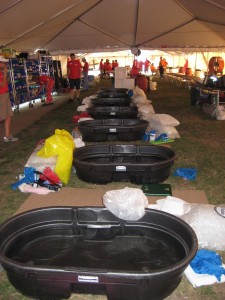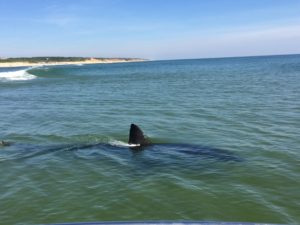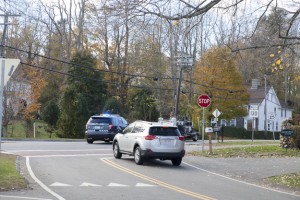
Line-up of ice tubs used to cool overheated runners
FALMOUTH – MASH had nothing on the two large medical tents stationed on the beach at the finish line of the 43rd New Balance Falmouth Road Race on Sunday. The canvas shelters were reminiscent of those Army tents where wounded troops were treated and doses of encouragement were handed out.
I got that same feeling as I passed under the large red “Medical” sign early Sunday morning and squinted to see inside the tent. There was even the sound of a helicopter hovering overhead, albeit the Massachusetts State Police monitoring the scene.
A sea of volunteers dressed in red T-shirts moved about in front of me. There was a quiet buzz as staff organized tubs of water, bags of ice, plastic covered pillows, and towels. Emergency medications were grouped on a table for easy access by the physicians, a defibrillator was on standby, IV’s hung from the side of the tent, and the triage area was made ready for assessments.
About 30 minutes into the race, the unusual heat and humidity had already started to take its toll on the runners. The atmosphere in the tent went from an urgent quiet to a surge of shouts announcing runners who needed help as they were escorted into the tent by volunteers.
“We had a handful of elite runners in the beginning, so we knew we were going to be busy” said Dr. Robert Davis, director of Emergency Services at Falmouth Hospital and one of the medical directors in the tent. Dr. Davis has been working the medical tent for 14 years.
“People were getting into trouble earlier,” he said, noting that runners were being seen at the medical tent on Scranton Avenue – the first of three medical tents staffed by Falmouth Hospital.
“This is one of the hottest years,” said Virginia Brodeur RN, who worked at Falmouth Hospital for 35 years and has been a volunteer at the road race since 1977.
Runners were treated for exertional heat illness which is defined as a temperature greater than 105 degrees with mental status changes, said Dr. Davis. When a person has a temperature of 105 degrees or greater longer than a half hour, proteins begin to break down, which can result in liver and kidney damage as well as muscle problems and neurological problems, he said.
Thus the urgency to bring down the temperature as quickly as possible. I was surprised by a shout of 109 degrees one of the nurses called out during one assessment. That runner was immediately carried to an ice water bath by a team.
As soon as the runner was placed in the tub, a volunteer started calling out time every five minutes and the runner’s temperature was checked. A group of six or so staff surrounded the tub, moving the ice water around, monitoring vital signs, talking to the runner, and providing ongoing visual assessments.
The runner cannot be in the tub any longer than 20 minutes and reach a temperature no lower than 102, said Dr. Raymond Gagnon, otherwise there is possibility of a seizure. Dr. Gagnon has been a medical volunteer in the tent many years and has run the road race more than a dozen times.
It is not uncommon to see runners with temperatures of 107 to 108 degrees, said Dr. Davis. The body becomes hot and sweaty and is unable to get rid of the heat.
In most years, between 15 and 30 runners are treated with ice baths, but at this year’s race the staff treated 30.
Those who didn’t respond well, took longer to recuperate or got too cold were transported to the hospital. A total of 135 runners were treated, 14 were transported to the hospital including a couple of spectators, said Dr. Davis. “We saw all ages and all different levels of runners,” Dr. Davis said.
As sick as the runners may be when they enter the tent, most leave on their own, with no ill effects. The medical staff and volunteers have this down pat, they work well together, they’re seasoned, and many have volunteered for years.
“It’s a great group, Dr. Davis and Dr. John Jardine (co-medical director) are outstanding,” said Dr. Gagnon.
By Roberta Cannon – OneCape Health News

























Speak Your Mind